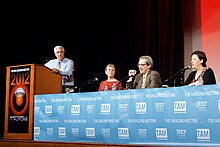David Gorski
David Henry Gorski is an American surgical oncologist and professor of surgery at Wayne State University School of Medicine.
[12] He is a professor of surgery and oncology at the Wayne State University School of Medicine,[9] whose laboratory conducts research on transcriptional regulation of vascular endothelial cell phenotype, as well as the role of metabotropic glutamate receptors in breast cancer.
[24] Gorski's work with Helena Mauceri and others, published in Nature in 1998 as "Combined effects of angiostatin and ionizing radiation in antitumour therapy" studied the "combined effects of angiostatin" (a protein occurring in several animal species) "and ionizing radiation in anti-tumor therapy"[25] led to investigation into the selective destruction of tumor cells, which according to a 1999 study by Gregg L. Semenza (citing Mauceri and others), "are more hypoxic than normal cells," allowing for "tumor cells to be killed without major systemic side effects.
[28] He has criticized the prevalence of pseudoscience in the medical field including the use of alternative therapies,[29][30] acupuncture,[31] detoxification,[32] and the use of dietary treatment to manage autism.
[34][35] Alissa Quart, writing for Columbia Journalism Review in 2010, described Orac as a "self-appointed autism expert" known for attacking the "vaccines-cause-autism set" and who had recently celebrated when an opponent lost their medical license.
[42] Writing for The Atlantic in 2011, David H. Freedman described Gorski as one of the more "prickly anti-alternative-medicine warriors"[43] and said he was "among a small, loud band of alt-med critics.
"[44] Gorski contributed to the James Randi Education Foundation's series of EBooks: Science Based Medicine Guides.
[52] Gorski has advocated for open research data of clinical trial results and for using only evidence-based medicine to treat disease.
[41] He has criticized the National Institutes of Health (NIH) and NCCAM for funding and publishing research on unproven therapies not supported by science-based evidence,[54][55] and has commented on medical ethics and methods of alternative medicine.
[56] Gorski has criticized popularization of pseudoscience by the media and celebrities such as Oprah Winfrey,[57] Bill Maher,[58] Ann Coulter,[59] and The Huffington Post.
